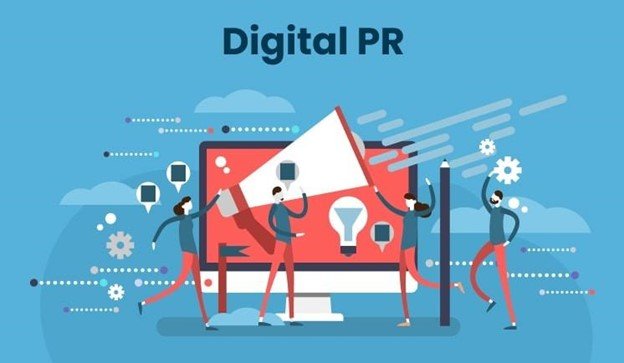One effective strategy for assisting companies in enhancing their online reputation and brand authority is digital public relations. It’s a platform that facilitates meaningful and constructive connections between companies and their clients. The benefits of digital PR are just as effective as conventional PR in controlling the messages that are spread about your business. The emphasis on internet reputation is where it differs.
Understanding what digital PR is and how it operates is crucial to appreciating the advantages. It is a tactic used to increase brand recognition via online or digital channels. In a congested online economy, it’s a potent tool that lets you build the brand recognition and messaging your business requires.
Digital PR is made up of several parts. It covers stuff like guest posting and blogging. It could include creating social media accounts and internet profiles. You might also include internet movies and podcasts that you share. All of this adds to the public’s awareness of your company and leadership.
Some Advantages Of Digital PR

1. Enhanced Online Visibility
One of the benefits of digital PR is it can significantly amplify your online presence. By securing coverage on high-authority websites, blogs, and social media platforms, your brand becomes more accessible to your target audience. Increased visibility not only strengthens brand awareness but also drives organic traffic to your website.
Collaborating with online influencers, journalists, and bloggers can help you tap into their established audiences, exposing your brand to potential customers who may not have encountered it otherwise. Additionally, digital PR efforts often result in backlinks, which improve your website’s search engine rankings.
2. Improved SEO Performance
One of the most impactful benefits of digital PR is its ability to boost search engine optimization (SEO). High-quality backlinks from reputable websites are a key ranking factor for search engines like Google. By generating content that earns these backlinks, digital PR enhances your domain authority and helps your website rank higher for relevant keywords.
Moreover, digital PR campaigns often involve the creation of shareable and engaging content, such as infographics, videos, and articles. This content not only attracts backlinks but also encourages social sharing, further improving your site’s visibility and credibility.
3. Strengthened Brand Reputation
In today’s digital age, reputation is everything. Digital PR allows brands to manage and enhance their online image through strategic storytelling and authentic communication. By highlighting your brand’s values, achievements, and contributions, you can build trust and credibility among your audience.
Effective digital PR also involves proactive reputation management. This includes monitoring online mentions, responding to feedback, and addressing any negative press promptly. By maintaining a positive narrative, you can protect and enhance your brand’s reputation in the eyes of stakeholders.
4. Increased Audience Engagement
The answer to why digital PR is important is that it fosters meaningful interactions with your audience by leveraging various online channels. From social media campaigns to interactive content, digital PR creates opportunities for engagement that build stronger connections with your audience.
Through digital PR, brands can participate in conversations, answer questions, and address concerns in real time. This responsiveness not only enhances customer satisfaction but also humanizes your brand, making it more relatable and approachable.
5. Cost-Effective Marketing
Compared to traditional PR methods, digital PR offers a more cost-effective way to achieve your marketing goals. Online campaigns often have lower production and distribution costs, allowing you to reach a larger audience without straining your budget.
Digital PR also provides measurable results, enabling you to track the performance of your campaigns and optimize them for better outcomes. By focusing on tactics that deliver the highest return on investment (ROI), you can make the most of your marketing resources.
6. Crisis Management Capabilities
In the fast-paced digital world, crises can arise unexpectedly. Digital PR equips brands with the tools and strategies needed to respond swiftly and effectively to potential challenges. By monitoring online conversations and sentiment, you can identify issues early and address them before they escalate.
A well-executed digital PR strategy ensures that your brand’s response is timely, transparent, and aligned with your values. This not only mitigates the impact of negative events but also demonstrates your commitment to accountability and customer satisfaction.
7. Thought Leadership Opportunities
The answer to why digital PR is important is that it positions your brand as a thought leader in your industry by showcasing your expertise and insights. Through guest posts, expert commentary, and participation in online discussions, you can establish yourself as a trusted authority in your field.
Being recognized as a thought leader enhances your credibility and attracts opportunities for collaboration, partnerships, and media coverage. It also strengthens your brand’s competitive edge by differentiating you from competitors.
8. Broader Audience Reach
Digital PR allows you to reach a global audience, breaking down geographical barriers that limit traditional PR efforts. With the power of the internet, your brand can connect with customers, partners, and stakeholders across the world.
By tailoring your digital PR campaigns to specific regions or demographics, you can effectively target diverse audiences while maintaining a consistent brand message. This expanded reach opens doors to new markets and growth opportunities.
9. Long-Term Impact
The benefits of digital PR extend far beyond the duration of a single campaign. High-quality content, backlinks, and media coverage have a lasting impact on your brand’s online presence and reputation. Over time, these assets continue to drive traffic, engagement, and conversions.
Digital PR also builds relationships with key influencers, journalists, and stakeholders that can benefit your brand in the long run. By nurturing these connections, you create a network of advocates who can amplify your message and support your future endeavors.
The Future of Digital PR
Digital PR is evolving rapidly, shaped by advancements in technology and shifts in consumer behavior. As businesses strive to maintain relevance in a crowded digital landscape, the future of digital PR and the benefits of digital PR hinge on innovation, personalization, and adaptability.
One key trend shaping the future of digital PR is the integration of artificial intelligence. AI tools enable PR professionals to analyze data, predict trends, and personalize campaigns at scale. For instance, AI-powered sentiment analysis tools can assess public opinion in real-time, allowing brands to adapt their messaging quickly. Chatbots and virtual assistants also offer new ways to engage with audiences, fostering stronger brand connections.
Another transformative factor is the rise of social media influencers and content creators. Influencer partnerships have become a cornerstone of digital PR, and this trend will continue to grow as influencers maintain their ability to reach niche audiences effectively. However, future campaigns will focus more on authenticity and alignment with brand values to combat growing skepticism about influencer marketing.
The proliferation of immersive technologies, such as augmented reality (AR) and virtual reality (VR), is set to revolutionize how brands tell their stories. Interactive experiences will enable brands to captivate audiences more effectively, making PR campaigns more engaging and memorable. Imagine a brand launching a product through an AR app that lets users “try” the product virtually before purchasing—it’s an opportunity to enhance both visibility and credibility.
Data privacy concerns are another factor shaping digital PR’s future. As regulations tighten and consumers become more conscious of how their data is used, brands must adopt transparent and ethical communication practices. Building trust through accountability will be a significant aspect of successful digital PR strategies.
Lastly, the future will emphasize the importance of real-time communication. With the fast-paced nature of news cycles and social media, brands must be prepared to address crises, share updates, and respond to public queries promptly. A strong, proactive online presence will be crucial in managing reputation and maintaining customer loyalty.
In conclusion, the future of digital PR lies in leveraging emerging technologies, fostering genuine connections, and embracing ethical practices. As digital landscapes continue to evolve, PR professionals who adapt to these changes while staying focused on storytelling and trust-building will thrive.
FAQ
Q: Is marketing or public relations superior?
A: For profit-driven businesses, increasing sales and attracting new clients are the main goals of marketing. Building a good brand and improving the organization’s reputation are the main goals of public relations. Despite their obvious differences, these two variables cooperate.
Q: How is SEO aided by digital PR?
A: By producing content that encourages high-ranking websites to link back to a business’s website, digital public relations (PPR) helps a brand become more credible and perform better in search engine results (SERPs). High-quality backlinks tell search engines that a website is reliable and relevant.
Q: Is a job in public relations a good fit?
A: The Best Creative and Media Jobs list places public relations specialists at number four. Jobs are graded based on how well they provide a difficult-to-quantify combination of variables. Learn more about how we determine which jobs are the best.







